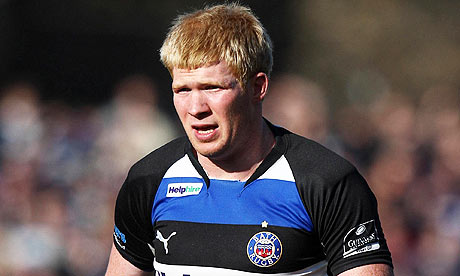
The guilty verdict reached today on three former Bath players who twice refused to take tests for illegal drugs in May after a club investigation into what happened during an end-of-season party in London paves the way for random testing for substances, such as cocaine, to be introduced in the coming season.
Although Michael Lipman, Alex Crockett and Andrew Higgins were not found to have taken an illegal substance, or given the impression that they had done so, during the party, as they were originally charged with, their two refusals to take a test highlighted a major flaw in the regulations.
The former Bath and England prop Matt Stevens was banned for two years in February after testing positive for cocaine following a Heineken Cup group match in Glasgow in December. Had he been required to provide a sample either the day before or after the game, he would not have been tested for cocaine or any other recreational drug, only performance-enhancing ones.
The three bodies who run the professional game in England – the Rugby Football Union, Premier Rugby and the Professional Rugby Players' Association – have spent the year drawing up plans for random testing for illicit drugs and today's decision gives them impetus.
"The ruling has strengthened the Premiership clubs' determination to take appropriate action to protect the core values of our sport," said the Premier Rugby chief executive, Mark McCafferty. "We recognise that with the growing popularity of the Premiership comes increasing risks, particularly for the health and welfare of our players. Our priority is to implement the new education and discipline programmes for the 2009-10 season to further address these types of risk, with the illicit drugs programme being the cornerstone."
Under the programme, players will be tested out of competition, usually at the start of a week because it takes cocaine three days to pass through a user's system. It has the full support of the PRA, whose chief executive, Damian Hopley, said his members were concerned that the image of the sport had suffered through the Stevens and Bath cases, and wanted a policy in place which would show that rugby union did not have a drug problem.
Lipman, Crockett and Higgins were charged by the RFU in June after an investigation into what happened during the London party which made the headlines with reports that a fight broke out with players from Harlequins in one pub and allegations that players had taken illicit drugs. A fourth Bath player, the former Australia second-row Justin Harrison, was also charged. He left the club in May after refusing to take a drug test and was last month banned for eight months by the RFU after admitting taking cocaine in a London pub in what he said was an isolated incident.
Lipman and Crockett, Bath's co-captains last season, resigned from the club, along with Higgins, in June after reportedly refusing to take part in Bath's inquiry. They denied taking drugs and refusing to take a drug test, even though it is believed they were advised by the PRA to take the tests, subject to their independence being established.
The careers of the three are now in limbo. Last November Lipman was playing for England and only missed out on the Six Nations because of injuries. The pending illicit drug-testing programme will concentrate the minds of potential employers.

